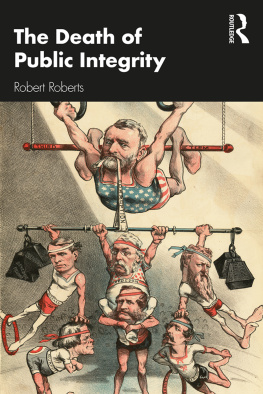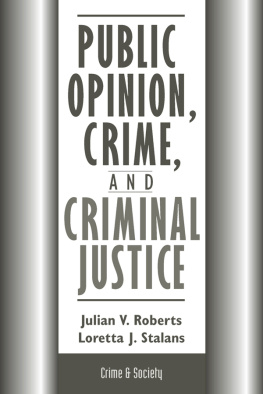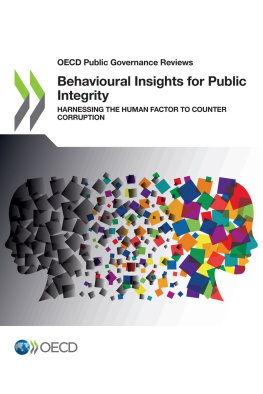THE DEATH OF PUBLIC INTEGRITY
From the late nineteenth century through the 1970s, several government reform movements succeeded in controlling traditional types of public corruption. But has this historic success led to a false sense of security among public management scholars and professionals? As this book argues, powerful special interests increasingly find effective ways to gain preferential treatment without violating traditional types of public corruption prohibitions. Although the post-Watergate good government reform movement sought to close this gap, the 1980s saw a backlash against public integrity regulation, as the electorate in the United States began to split into two sharply different camps driven by very different moral value imperatives.
Taking a historical view from the ratification of the U.S. Constitution through to the Trump administration, The Death of Public Integrity details efforts by reformers to protect public confidence in the integrity of government at the local, state, and federal levels. Arguing that progressives and conservatives increasingly live in different moral worlds, author Robert Roberts demonstrates the ways in which it has become next to impossible to hold public officials accountable without agreement on what constitutes immoral conduct. This book is required reading for students of public administration, public policy, and political science, as well as those interested in public service ethics.
Robert Roberts is Professor of Political Science at James Madison University, U.S.A. Articles by Professor Roberts have appeared in the Public Administration Review, International Journal of Public Administration, Public Integrity, PS (Political Science), and Politics and Policy. Professor Roberts teaches courses in Introduction to Public Administration, Legal Environment of Public Administration, Criminal Procedure, and State and Local Government.
THE DEATH OF PUBLIC INTEGRITY
Robert Roberts
First published 2020
by Routledge
52 Vanderbilt Avenue, New York, NY 10017
and by Routledge
2 Park Square, Milton Park, Abingdon, Oxon, OX14 4RN
Routledge is an imprint of the Taylor & Francis Group, an informa business
2020 Taylor & Francis
The right of Robert Roberts to be identified as author of this work has been asserted by him in accordance with sections 77 and 78 of the Copyright, Designs and Patents Act 1988.
All rights reserved. No part of this book may be reprinted or reproduced or utilised in any form or by any electronic, mechanical, or other means, now known or hereafter invented, including photocopying and recording, or in any information storage or retrieval system, without permission in writing from the publishers.
Trademark notice: Product or corporate names may be trademarks or registered trademarks, and are used only for identification and explanation without intent to infringe.
Library of Congress Cataloging-in-Publication Data
A catalog record for this title has been requested
ISBN: 978-0-367-34842-7 (hbk)
ISBN: 978-0-367-34843-4 (pbk)
ISBN: 978-0-429-32836-7 (ebk)
Typeset in Bembo
by codeMantra
I dedicate this book to my wife, Deborah, and to my children, William and Caitlin.
I would like to express my sincere appreciation to a number of individuals and organizations who supported the research and writing of this book, especially Professor David Rosenbloom of American University and Dr. James D. Carroll. I would also like to express my appreciation to my fellow faculty members of the Department of Political Science at James Madison University who provided me significant input regarding the subject of public integrity in the United States and political behavior. Specifically, I would like to recognize the input provided by Professors Dr. Bernd Kaussler and Dr. Valerie A. Sulfaro.
History tells us that colonial outrage over the moral bankruptcy of the British Empire played a major role in igniting the flame that led to the American Revolution. Many of those that led the struggle to free the colonies from English control viewed the Revolution as much as a moral crusade as a battle for political freedom. Remarkably, many of the leaders of the American Revolution embraced the notion of entrusted power. Critics of this idealistic view of the moral character of the nations early leaders argue that some of these same leaders engaged in immoral conduct. Thomas Jefferson, for instance, engaged in a long-term sexual relationship with one of his slaves, Sally Hemings. This relationship led Jefferson to father children outside of a marriage. This fact does not lessen the fact that the concept of entrusted power shaped how many early leaders of the United States performed their official duties. Many of the nations early leaders took seriously their obligation to live a virtuous public or political life. Sadly, they proved profoundly unsuccessful in passing their own commitment to virtue to the new generation of the nations leaders. This fact had led directly to a public integrity crisis that threatened the nations democratic institutions.
During the first half of the nineteenth century, the democratization of American society led to a shift of power from a narrow group of like-minded political elites to individuals who saw nothing immoral or inappropriate about the use of political power to speed their upward mobility. Democratization opened the door for millions of Americans to become active political participants. It took resources and organizations to mobilize these individuals into a political force. A new generation of political entrepreneurs rejected the values associated with entrusted power and embraced political power as a tool to reward supporters and punish enemies. With a remarkable degree of success, these political entrepreneurs successfully undertook a hostile takeover of the nations electoral system and democratic institutions. This came at a particularly bad time for the American people. The flood of millions of immigrants into the nations cities created a public management crisis. New residents needed help to survive. Governments turned their backs and forced new residents largely to fend for themselves. Large cities found themselves devastated by disease due to the lack of clean water and the lack of ability to remove human and animal waste. Pollution fouled the air and cut the lives short of countless number of urban residents. Immigrants experienced horrible working and living conditions. Many new residents turned to political machines for help to survive. Political parties and machines routinely helped new immigrants find jobs and housing. In return, political machines demanded political loyalty. This included individuals hired as public employees. Political loyalty became a mandatory qualification for public service at the local, state, and federal levels.
After the Civil War, the centralization of economic power further complicated efforts to bring public corruption under control. Powerful economic interests used their power to assure that elected officials at the state and local levels would not interfere with their efforts to accumulate even more economic power. Those outside of urban area did not escape severe economic consequences created by the monopolization of the American economy. Railroads controlled access of farmers to markets. Small business owners relied upon railroad to get goods to sell to their rural and small own customers. The American Dream had become an American nightmare. Who would step up to take on ruthless political machines and equally ruthless trusts and monopolies? Would a new generation of leaders emerge who would place public service ahead of personal or corporate self-interest?












